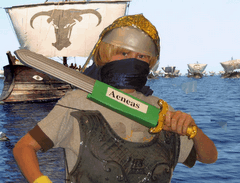 pedagogy19k Jigsaw Puzzle
pedagogy19k Jigsaw PuzzleI just heard about a Website that will enable you to make your own jigsaw puzzles for free! Click on the picture above to see how the puzzle works. The site is called jigzone.com. Simply upload a picture file, and you will get a link to a puzzle of your picture that you can post anywhere. I heard about jigzone while listening to Joan and Ben's SMART Board Lesson Podcast. Students can then manipulate this puzzle on the computer to complete the picture. If you have a SMART Board, the picture could be on the SMART Board as students walk in, as a way to introduce a lesson. Those who come in first could go up and manipulate the pieces to put it together. If you don't have a SMART Board, have the puzzle on a computer in your room for students to manipulate.
I'm going to use my puzzle on a SMART Board at the beginning of a teacher training on Word, where we will discuss the different tool palettes. A way to use this puzzle idea in Language Arts would be to create a picture with two or three vocabulary words, and align pictures above the correct words. Having students put these puzzles together gives them some time-on-task with viewing the vocabulary words and thinking about their meanings, while they have fun putting the puzzle together at the same time. You could also challenge students to create their own puzzles, typing in vocabulary words and finding pictures to accompany the pictures. I created my pictures and text using Photoshop. The person who shared this idea said he created his picture by using a free photo editor called PhotoFiltre. This application, however is only for PC. Go to Google's Piscasa for a free MAC photo editor.






